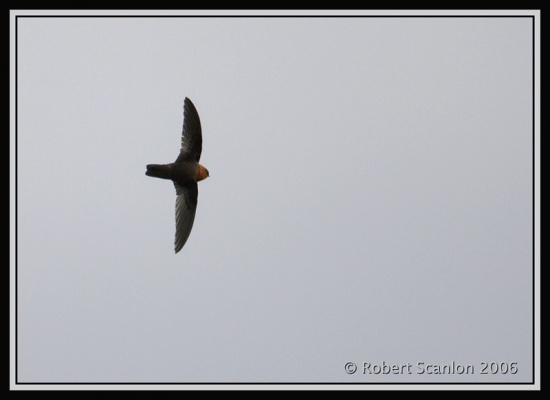Nomdeploom (talk | contribs) |
(Photo caption. References) |
||
| Line 1: | Line 1: | ||
;[[:Category:Streptoprocne|Streptoprocne]] rutila | ;[[:Category:Streptoprocne|Streptoprocne]] rutila | ||
| − | [[Image:Chestnut-collared_Swift.jpg|thumb|550px|right|Photo | + | [[Image:Chestnut-collared_Swift.jpg|thumb|550px|right|Photo by {{user|Robert+Scanlon|Robert Scanlon}}<br />Near Manizales, [[Colombia]], March 2006]] |
==Identification== | ==Identification== | ||
| − | Length 13cm | + | Length 13cm<br /> |
| + | Reddish throat and collar, only partial or missing in females. Broad, shallowly forked tail, even less forked in females. Plumage blackish, a bit paler below.<br /> | ||
| + | '''Juveniles''' very similar to collarless females. | ||
====Similar Species==== | ====Similar Species==== | ||
Similar to [[Tepui Swift]], but ranges don't overlap | Similar to [[Tepui Swift]], but ranges don't overlap | ||
| Line 9: | Line 11: | ||
Rather local, but in part of its range common and not globally threatened. | Rather local, but in part of its range common and not globally threatened. | ||
==Taxonomy== | ==Taxonomy== | ||
| − | Forms a superspecies with [[Tepui Swift]]. Both species are sometimes placed in [[:Category:Cypseloides|Cypseloides]] or earlier in [[:Category:Chaetura|Chaetura]].< | + | Forms a superspecies with [[Tepui Swift]]. Both species are sometimes placed in [[:Category:Cypseloides|Cypseloides]] or earlier in [[:Category:Chaetura|Chaetura]]. |
| − | + | ====Subspecies==== | |
| + | Three subspecies<sup>[[#References|[1]]]</sup>: | ||
* ''S.r. rutila'' from [[Trinidad]] and [[Guyana]] east to [[Venezuela]] | * ''S.r. rutila'' from [[Trinidad]] and [[Guyana]] east to [[Venezuela]] | ||
* ''S.r. brunnitorques'' from SE [[Mexico]] south to [[Bolivia]] | * ''S.r. brunnitorques'' from SE [[Mexico]] south to [[Bolivia]] | ||
| Line 21: | Line 24: | ||
Breeding recorded from May to August, differing in various parts of range. Nest build usually near water in very humid and shaded sites on rock faces. Lays two eggs.<br/> | Breeding recorded from May to August, differing in various parts of range. Nest build usually near water in very humid and shaded sites on rock faces. Lays two eggs.<br/> | ||
Some populations seem to migrate, but the exact movement of this species is not clearly understood. | Some populations seem to migrate, but the exact movement of this species is not clearly understood. | ||
| + | ==References== | ||
| + | #{{Ref-Clements6thDec09}} | ||
| + | {{ref}} | ||
==External Links== | ==External Links== | ||
{{GSearch|Streptoprocne+rutila}} | {{GSearch|Streptoprocne+rutila}} | ||
[[Category:Birds]] [[Category:Streptoprocne]] | [[Category:Birds]] [[Category:Streptoprocne]] | ||
Latest revision as of 23:41, 23 November 2010
- Streptoprocne rutila
Identification
Length 13cm
Reddish throat and collar, only partial or missing in females. Broad, shallowly forked tail, even less forked in females. Plumage blackish, a bit paler below.
Juveniles very similar to collarless females.
Similar Species
Similar to Tepui Swift, but ranges don't overlap
Distribution
From Western Mexico over Central America to Colombia, Ecuador, Peru, Bolivia, Venezuela, Guyana and Trinidad.
Rather local, but in part of its range common and not globally threatened.
Taxonomy
Forms a superspecies with Tepui Swift. Both species are sometimes placed in Cypseloides or earlier in Chaetura.
Subspecies
Three subspecies[1]:
- S.r. rutila from Trinidad and Guyana east to Venezuela
- S.r. brunnitorques from SE Mexico south to Bolivia
- S.r. griseifrons in Western Mexico
Habitat
Montane evergreen forest, also secondary forest and scrub. Usually in the highlands higher than 500m. Seen feeding at lower levels when bad weather in mountains.
Behaviour
Like other Swifts highly gregarious and often seen in big flocks, sometimes mixed with White-collared Swift or other Swifts.
Feeds on various insects, taken in flight.
Breeding recorded from May to August, differing in various parts of range. Nest build usually near water in very humid and shaded sites on rock faces. Lays two eggs.
Some populations seem to migrate, but the exact movement of this species is not clearly understood.
References
- Clements, JF. 2009. The Clements Checklist of Birds of the World. 6th ed., with updates to December 2009. Ithaca: Cornell Univ. Press. ISBN 978-0801445019.
Recommended Citation
- BirdForum Opus contributors. (2024) Chestnut-collared Swift. In: BirdForum, the forum for wild birds and birding. Retrieved 18 May 2024 from https://www.birdforum.net/opus/Chestnut-collared_Swift




